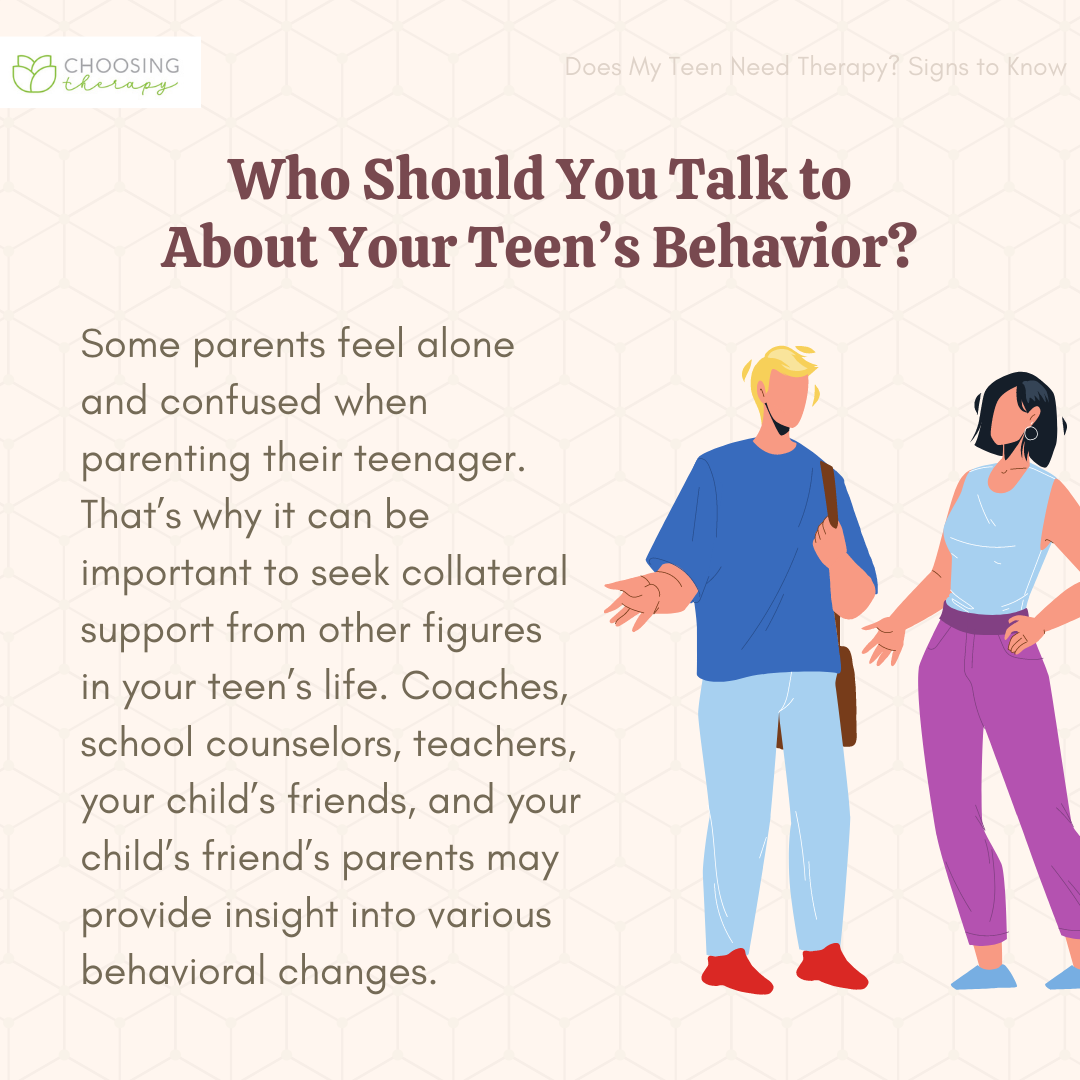Recognizing the Advantages of Teen Therapy for Emotional Well-being
Teen therapy plays a crucial function in sustaining emotional health throughout a critical stage of growth. It urges teenagers to share their sensations and equips them with necessary coping methods. As they involve in this therapeutic process, they not just improve their interaction abilities yet likewise foster meaningful relationships. teenage counselling near me. Yet, the impact of therapy prolongs past instant advantages. Understanding how these elements link discloses much deeper insights right into the lasting benefits of treatment for young adults
The Relevance of Psychological Expression in Teens
Although several teens struggle with emotional expression, it plays a crucial duty in their advancement and health. Throughout this transformative phase, the capacity to articulate sensations can significantly influence their psychological health and wellness. When teenagers reveal their feelings, they promote self-awareness, enabling them to recognize their sensations and experiences much more deeply. This understanding can result in healthier connections, as open interaction advertises compassion and connection with peers and family members.
Emotional expression offers as an essential electrical outlet for tension and anxiousness, reducing the chance of internalizing negative feelings. Teens that feel comfortable revealing emotions are a lot more outfitted to navigate problems and challenges, enhancing their durability. This ability not just advantages their instant mood yet additionally lays the foundation for long-lasting emotional knowledge. Hence, supporting emotional expression in adolescents is necessary for their general development and future wellness, equipping them to become well balanced and psychologically healthy grownups.
Structure Coping Skills Through Therapy

Many teenagers profit significantly from therapy as it provides them with necessary coping abilities to take care of life's difficulties. Treatment furnishes young adults with devices to browse challenging emotions, stress factors, and interpersonal conflicts. Through various restorative techniques, such as cognitive-behavioral methods and mindfulness methods, adolescents find out to determine negative thought patterns and replace them with even more constructive ones.
These skills are vital for promoting durability and psychological guideline. Furthermore, treatment encourages the development of analytical abilities, which empower teenagers to challenge challenges instead of prevent them. By practicing coping techniques in a secure environment, teenagers gain confidence in their ability to take care of future problems.
Inevitably, the coping skills acquired throughout treatment not just improve immediate psychological wellness but likewise lay a structure for long-lasting mental health. As young adults learn to use these skills, they come to be more proficient at taking care of stress and navigating the intricacies of their developmental years.
Enhancing Interaction and Relationships
Therapy not just help in building coping skills yet also plays a crucial duty in boosting communication and connections for teens. Through assisted communications, young adults discover to reveal their sensations and ideas better, promoting open dialogue with peers and relative. This enhanced interaction is critical during a developmental phase identified by psychological disturbance and social complexities.
In treatment, teenagers check out the dynamics of their relationships, acquiring insights right into both non-verbal and verbal signs. They establish active listening skills and compassion, which are essential for supporting healthy and balanced connections. As they discover to articulate their read what he said emotions, disputes and misconceptions frequently diminish, causing more powerful bonds with loved ones.
In addition, treatment motivates teens to develop limits and identify undesirable patterns in their connections. By dealing with these problems, they can grow more helpful and meeting connections, ultimately improving their overall emotional well-being.
Establishing Self-Identity and Self-confidence

As teens navigate the intricacies of adolescence, creating a solid sense of self-identity and confidence ends up being vital. Therapy provides a safe space for teens to discover their experiences, thoughts, and feelings, enabling them to comprehend who they are past exterior expectations. Through led discussions and activities, they can determine their toughness, rate of interests, and worths, which contribute to a more coherent self-concept.
Additionally, therapy encourages young adults to accept their uniqueness, fostering a feeling of pride in their one-of-a-kind top qualities. As they learn to verbalize their thoughts and sensations, their self-confidence often improves, bring about increased self-confidence in various aspects of life, consisting of social communications and decision-making.
Eventually, therapy works as a useful tool in helping teens develop a robust self-identity, encouraging them to navigate their formative years with higher assurance and credibility (therapist for teens near me). This foundation is essential for their psychological health and future personal advancement
Fostering Resilience in the Face of Difficulties
While browsing the tumultuous landscape of adolescence, teens commonly experience different obstacles that test their emotional stamina and adaptability. Treatment serves see post as a crucial tool in cultivating resilience during these developmental years. Through healing treatments, teens learn to determine their psychological reactions and develop dealing approaches that empower them to deal with misfortune.

In a supportive atmosphere, they discover their feelings, enabling them to process problems and frustrations better. This process not just improves psychological law but likewise urges a growth attitude, where difficulties are watched as opportunities for advancement as opposed to overwhelming barriers.
Frequently Asked Questions
Just how Do I Know if My Teen Needs Therapy?
Indications that a fantastic read a teenager might require therapy include consistent unhappiness, withdrawal from activities, changes in eating or sleeping practices, scholastic decrease, substance use, or regular state of mind swings. counselling for teens. Observing these behaviors can suggest the requirement for specialist support
What Sorts of Treatment Are Ideal for Teens?
Cognitive-behavioral therapy, dialectical behavior modification, and household treatment are effective for teenagers. Each method addresses emotional difficulties distinctively, promoting coping abilities, psychological policy, and enhanced family characteristics, inevitably promoting much healthier interaction and psychological strength.
How Can I Support My Teen Throughout Therapy?
Supporting a teen during treatment includes energetic listening, motivating open interaction, showing compassion, and respecting their personal privacy. In addition, providing a secure setting and acknowledging their sensations can significantly boost their healing experience and emotional development.
What Should I Expect in a Therapy Session?
In a treatment session, one can expect discussions concerning ideas, actions, and sensations. The specialist may make use of different strategies to foster understanding, construct trust fund, and encourage self-reflection, ultimately guiding the specific in the direction of individual development and healing.
Exist Any Risks Connected With Teenage Therapy?

Yes, risks connected with adolescent treatment might include sensations of pain, prospective miscommunication, or psychological distress throughout sessions. In addition, otherwise correctly matched with a therapist, the therapeutic connection may hinder development and trust fund.
Teenager therapy plays a vital function in supporting emotional well-being during a critical phase of development. Eventually, the coping abilities gotten throughout therapy not just enhance prompt psychological health however additionally lay a foundation for lifelong mental wellness. Therapy provides a secure room for teens to explore their experiences, feelings, and thoughts, allowing them to comprehend that they are past exterior expectations. Cognitive-behavioral therapy, dialectical actions therapy, and family therapy are effective for young adults. Yes, dangers linked with teen therapy may include sensations of discomfort, possible miscommunication, or emotional distress throughout sessions.